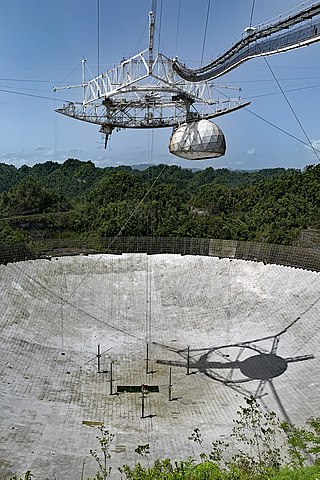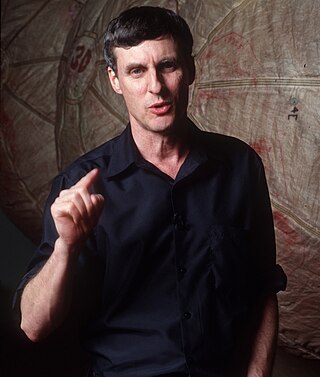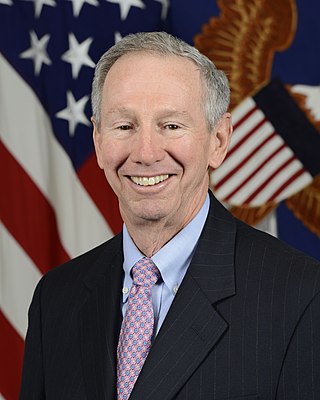Related Research Articles

The University of Central Florida (UCF) is a public research university with its main campus in unincorporated Orange County, Florida. It is part of the State University System of Florida. With 68,442 students as of the Fall 2022 semester, UCF has the second-largest on-campus student body of any public university in the United States. UCF is classified among "R1: Doctoral Universities – Very high research activity" and is accredited by the Commission on Colleges of the Southern Association of Colleges and Schools.

The Arecibo Observatory, also known as the National Astronomy and Ionosphere Center (NAIC) and formerly known as the Arecibo Ionosphere Observatory, is an observatory in Barrio Esperanza, Arecibo, Puerto Rico owned by the US National Science Foundation (NSF).

Russell Louis "Rusty" Schweickart is an American aeronautical engineer, and a former NASA astronaut, research scientist, U.S. Air Force fighter pilot, as well as a former business executive and government executive.

The Discovery Program is a series of Solar System exploration missions funded by the U.S. National Aeronautics and Space Administration (NASA) through its Planetary Missions Program Office. The cost of each mission is capped at a lower level than missions from NASA's New Frontiers or Flagship Programs. As a result, Discovery missions tend to be more focused on a specific scientific goal rather than serving a general purpose.

Steven Weldon Squyres is an American geologist and planetary scientist. He was the James A. Weeks Professor of Physical Sciences at Cornell University in Ithaca, New York. His research area is in planetary sciences, with a focus on large solid bodies in the Solar System such as the terrestrial planets and the moons of the Jovian planets. Squyres was the principal investigator of the Mars Exploration Rover Mission (MER).

Thomas David Jones is a former United States astronaut. He was selected to the astronaut corps in 1990 and completed four Space Shuttle flights before retiring in 2001. He flew on STS-59 and STS-68 in 1994, STS-80 in 1996, and STS-98 in 2001. His total mission time was 53 days 48 minutes. He works as a planetary scientist, space operations consultant, astronaut speaker, and author.

Michael Douglas Griffin is an American physicist and aerospace engineer who served as the Under Secretary of Defense for Research and Engineering from 2018 to 2020. He previously served as Deputy of Technology for the Strategic Defense Initiative, and as Administrator of NASA from April 13, 2005, to January 20, 2009. As NASA Administrator Griffin oversaw such areas as private spaceflight, future human spaceflight to Mars, and the fate of the Hubble telescope.

Colonization or settlement of Mars is the theoretical human migration and long-term human establishment of Mars. The prospect has garnered interest from public space agencies and private corporations and has been extensively explored in science fiction writing, film, and art.

Asteroids, including those in the asteroid belt have been suggested as a possible site of human colonization. Some of the driving forces behind this effort to colonize asteroids include the survival of humanity, as well as economic incentives associated with asteroid mining. The process of colonizing asteroids does have many obstacles that must be overcome for human habitation, including transportation distance, lack of gravity, temperature, radiation, and psychological issues.

FBC Mortgage Stadium is an American football stadium located in Orlando, Florida, United States, on the main campus of the University of Central Florida. It is the home field of the UCF Knights of NCAA Division I FBS college football; also it was home of the now defunct Orlando Apollos during the first and only 2019 season of the Alliance of American Football.

The National Aeronautics and Space Administration is an independent agency of the U.S. federal government responsible for the civil space program, aeronautics research, and space research. Established in 1958, NASA succeeding the National Advisory Committee for Aeronautics (NACA), to give the U.S. space development effort a distinctly civilian orientation, emphasizing peaceful applications in space science. NASA has since led most American space exploration, including Project Mercury, Project Gemini, the 1968–1972 Apollo Moon landing missions, the Skylab space station, and the Space Shuttle. NASA currently supports the International Space Station and oversees the development of the Orion spacecraft and the Space Launch System for the crewed lunar Artemis program, the Commercial Crew spacecraft, and the planned Lunar Gateway space station.
The Solar System Exploration Research Virtual Institute (SSERVI), originally the NASA Lunar Science Institute, is an organization, established by NASA in 2008, that supplemented and extended existing NASA lunar science programs. Supported by the NASA Science Mission Directorate (SMD) and the Exploration Systems Mission Directorate (ESMD), SSERVI is a NASA program office located at the NASA Ames Research Center and was modeled on the NASA Astrobiology Institute (NAI) with dispersed teams across the nation working together to help lead the agency's research activities related to NASA's human exploration goals. Competitively selected team investigations focused on one or more aspects of lunar science investigations of the Moon, from the Moon, and on the Moon.

Honeybee Robotics is a subsidiary of Blue Origin that builds advanced spacecraft, robotic rovers, and other technologies for the exploration of Mars and other planetary bodies in deep space. The company, headquartered in Brooklyn, New York, has additional production facilities in Altadena, California and Longmont, Colorado. The company has 284 employees and creates exploration systems, infrastructure systems, and motion control software for the National Aeronautics and Space Administration (NASA), the Japanese Aerospace Exploration Agency (JAXA), Blue Origin, and other customers. On May 19th, 2023, Honeybee Robotics' parent company, Blue Origin, won a $3.4 Billion contract to build a moon lander and additional spacecraft for NASA's Artemis program. The team, led by Blue Origin, is a partnership between Lockheed Martin, Draper, Boeing, Astrobotic, and Honeybee Robotics.

The Florida Space Institute (FSI) is a research institute of the State University System of Florida and the University of Central Florida located in Orlando, Florida, United States.

Nadine G. Barlow (1958-2020) was an American planetary scientist. She was a professor in the Department of Physics and Astronomy at Northern Arizona University (NAU). She became Associate Chair of the NAU Department of Physics and Astronomy in Fall 2010. She was also the director of the Northern Arizona University/NASA Space Grant Program and an associate director of the Arizona Space Grant Consortium.
Sheyene Gerardi is an Italo-Venezuelan former actress, producer, media proprietor, and mining executive. She is the Lead of Robotics Outreach at NASA (CLASS), where she co-founded the NASA´s Planetary Landing Team in 2018. Gerardi is the founder of the Sheyene Institute, she operates two philanthropic organizations through the Sheyene Gerardi Foundation. The Sheyene School, to address technological literacy. The Sheyene e-health, an electronic healthcare information delivery network for rare diseases, after becoming a survivor of an unclassifiable splenic hairy small B-Cell non-Hodgkin lymphoma, a rare cancer. Sheyene is member of The International Political Science Association (IPSA), the American Society of International Law and member to the Women's International League for Peace and Freedom
The World Is Not Enough (WINE) is a US project developing a refuelable steam engine system for spacecraft propulsion. WINE developed a method of extracting volatiles from ice, ice-rich regolith, and hydrated soils and uses it as steam propulsion which allows the spacecraft to refuel multiple times and have an extraordinary long service lifetime. This would allow a single spacecraft to visit multiple asteroids, comets or several landing locations at an icy world such as the Moon, Mars, Pluto, Enceladus, Ganymede, Europa, etc.
Charles Negy is an American psychologist. He was an associate professor of psychology at the University of Central Florida. Beginning in June 2020, Negy was placed under investigation for alleged misconduct. His position at the university has been at the center of controversy over tweets about a supposed and subsequent hostile learning environment in his classes reported by students. In May 2022, an arbitrator ordered his re-instatement.
References
- 1 2 Daniel Turner Britt, NASA
- ↑ Daniel Britt, University of Central Florida
- ↑ Zenaida Gonzalez Kotala (6 May 2022), National Engineering Association Honors UCF's Space Dirt Expert, University of Central Florida